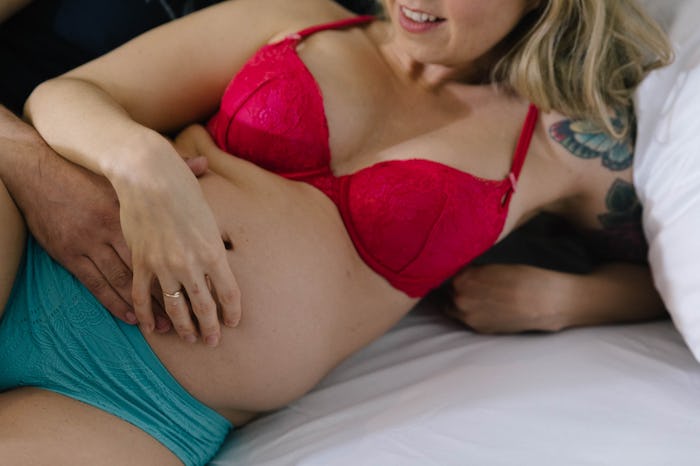Life
The Truth About Sex In The 1st Trimester Will Put You At Ease
When you're newly pregnant, it all feels so insubstantial — your state invisible, and the tiny baby inside seems impossibly fragile. I remember those dreamy, frightening first weeks of pregnancy when I worried unnecessarily about everything: the food I ate, riding my bike, and just about every cleaning product under my sink. Like many women, I also worried about intimacy. Can sex during the first trimester cause a miscarriage, I wondered? Is early pregnancy really that fragile?
Miscarriage isn't uncommon. The Mayo Clinic Guide To A Healthy Pregnancy noted that 15 to 20 percent of pregnancies end in miscarriage, and quite likely more, as many miscarriages occur so early, women don't even realize they've conceived and lost. But The Guide is very clear that "routine activities" — such as moderate exercise, and yes, sex — don't cause miscarriages. If they did, can you imagine humans making it this far?
According to the American Pregnancy Association, you're statistically most likely to miscarry in the first 13 weeks — in other words, during your first trimester. Parenting reported, however, that miscarriages are most often due to chromosomal abnormality. Such early miscarriage can affect anyone, and doesn't mean your body is fragile, or that you've done anything wrong. The creation of new life is an incredibly complex process that won't succeed 100 percent of the time.
So what about sex? Doctors unequivocally respond that first trimester sex is extremely safe for women with uncomplicated pregnancies. In fact, sex throughout pregnancy is nearly always safe, unless an underlying issue, such as placenta previa, is present, noted WebMD. But the vast majority of women can strike sex off their list of pregnancy worries.
However, some lifestyle factors may increase your chance of miscarriage. The American Society of Reproductive Medicine (ASRM) cited smoking and illegal drug use as potential causes of pregnancy loss, and suggested that limiting alcohol and caffeine can also decrease your risk.
Excessive alcohol use, smoking, and drugs — these things are terrible for you, and it's no wonder that they might not be great for pregnancy either. But sex is healthy, noted Everyday Health. It relieves stress, provides a little exercise, improves mood, and helps you connect with your partner. You might feel squeamish about it — or too nauseous to consider having sex at all — but sex simply won't endanger a low-risk, early pregnancy. Of course, if you have any concerns about sex during pregnancy, always, always consult your doctor, because they know your unique situation best. But assuming your doctor gives you the OK, you're cleared to enjoy sex as before.
Anxiety is normal. But I promise you'll breathe easier after week 13, when your miscarriage risk drops dramatically. You'll also have grown accustomed to being pregnant, and it won't feel so fragile and strange anymore. My doctor gave me this advice when I showed up with a list of fears at my first pregnancy check up: "Just remember, babies are tough. And so are you."
If you do suffer a miscarriage, the emotional pain can be overwhelming. Remember, it's not your fault, and help is available. Preganancy After Loss Support (PALS) offers a variety of resources for women recovering, physically and emotionally, from miscarriage.
